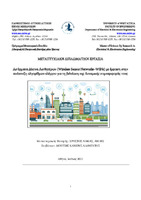| dc.contributor.advisor | Kandris, Dionisis | |
| dc.contributor.author | Νάκας, Χρήστος | |
| dc.date.accessioned | 2021-08-30T09:18:48Z | |
| dc.date.available | 2021-08-30T09:18:48Z | |
| dc.date.issued | 2021-07-01 | |
| dc.identifier.uri | https://polynoe.lib.uniwa.gr/xmlui/handle/11400/1110 | |
| dc.identifier.uri | http://dx.doi.org/10.26265/polynoe-961 | |
| dc.description.abstract | Wireless Sensor Networks (WSNs), due to their extraordinary abilities and their countless number of applications, are considered to be among the most emerging technologies. However, the lifetime of WSNs is tremendously delimited due to the restricted energy capacity of their nodes. For this reason, energy preservation is thought as the most important research concern for WSNs, as the radio communication of a sensor node is its most consuming operation in terms of energy resources. This thesis aims to provide a thorough study on WSNs with emphasis on the protocols and algorithms that pursuit the optimization of their operation in terms of energy efficiency. In this context, the thesis consists of four chapters. In Chapter 1, the reader is introduced into the domain of WSNs. Specifically, the structure of WSNs is described, and the operation of the wireless sensor nodes is explained. Additionally, the thesis provides the state-of-the-art of applications of WSNs so as to both empower the understanding of this scientific region and aid the development of novel applications. In order to accomplish this objective, the key classes of applications of WSNs are considered, and representative samples of them are presented. Their specific features are clarified, while their advantages and disadvantages are indicated. Furthermore, specific concerns regarding these particular classes are discussed. Next, the advantages that utilization of WSNs provides are discussed. Finally, the problems that WSNs are associated with are highlighted. In Chapter 2, the thesis focuses on how the operation of WSNs can be improved by increasing the energy efficiency in data routing in order to lessen the main problem that obstructs the utilization of WSNs i.e. the energy inadequacy of their sensor nodes. Specifically, an exhaustive survey of energy efficient routing protocols that have been proposed in order to be used in WSNs is conducted. In this survey, both traditional and modern protocols presented are classified, into four main categories, according to: i) the network structure, ii) the way used to are exchange data, iii) whether information of location is used and iv) whether multiple paths or Quality of Service (QoS)are sustained. For each of the protocols analyzed, its main features are explained and its corresponding advantages and disadvantages are emphasized. Chapter 3, relates with the use of a powerful software environment to develop simulation tests for energy efficient routing protocols. Specifically, Network Simulator 3 (NS-3) is the platform that has been utilized in order to develop appropriate program codes that represent the operation of two hierarchical routing protocols that namely are LEACH and TEEN. These protocols are simulated in multiple operation scenarios and their performance within every scenario has been evaluated. Finally, in Chapter 4, concluding remarks are drawn and suggestions for future research are provided. | el |
| dc.format.extent | 139 | el |
| dc.language.iso | en | el |
| dc.publisher | Πανεπιστήμιο Δυτικής Αττικής | el |
| dc.rights | Αναφορά Δημιουργού - Μη Εμπορική Χρήση - Παρόμοια Διανομή 4.0 Διεθνές | * |
| dc.rights | Attribution-NonCommercial-NoDerivatives 4.0 Διεθνές | * |
| dc.rights.uri | http://creativecommons.org/licenses/by-nc-nd/4.0/ | * |
| dc.subject | Wireless sensor networks | el |
| dc.subject | Ασύρματα δίκτυα αισθητήρων | el |
| dc.subject | WSN | el |
| dc.subject | Energy efficient routing protocols | el |
| dc.subject | Αλγόριθμοι | el |
| dc.title | Wireless Sensor Networks (WSNs) with emphasis on the development of control algorithms for improvement of their dynamic behavior | el |
| dc.title.alternative | Ασύρματα δίκτυα αισθητήρων (Wireless Sensor Networks–WSNs) με έμφαση στην ανάπτυξη αλγορίθμων ελέγχου για τη βελτίωση της δυναμικής συμπεριφοράς τους | el |
| dc.type | Μεταπτυχιακή διπλωματική εργασία | el |
| dc.contributor.committee | Voudouris, Konstantinos | |
| dc.contributor.committee | Ραγκούση, Μαρία | |
| dc.contributor.faculty | Σχολή Μηχανικών | el |
| dc.contributor.department | Τμήμα Ηλεκτρολόγων και Ηλεκτρονικών Μηχανικών | el |
| dc.contributor.master | Ηλεκτρικές και Ηλεκτρονικές Επιστήμες μέσω Έρευνας (MSc by Research in Electrical and Electronics | el |


